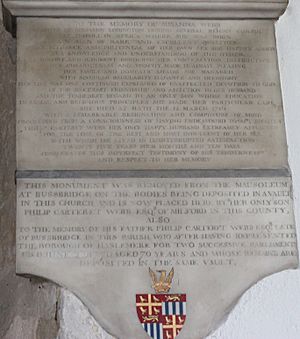Philip Carteret Webb facts for kids
Philip Carteret Webb (born August 14, 1702 – died June 22, 1770) was an English lawyer and a keen historian. He loved studying old things and history, which was part of a movement called the "antiquarian movement" in the 1700s.
Webb joined the Society of Antiquaries in London in 1747. As their lawyer, he helped the Society become officially recognized in 1751. This was a big deal because it helped the Society gain respect and funding, similar to the Royal Society, which also studied important subjects.
Webb is also remembered for his role in a famous event called the North Briton scandal in 1763. He helped the government seize the papers of a writer named John Wilkes. Wilkes wrote articles that made the king very angry.
Contents
Early Life and Career
Philip Carteret Webb was born in Devizes, a town in Wiltshire, England. He became a lawyer on June 20, 1724. He first worked in London, moving his office a few times before settling in Great Queen Street. He continued his legal studies at the Middle Temple in 1727 and Lincoln's Inn in 1741.
Early in his career, Webb became known for his deep knowledge of old legal records and constitutional law. After a rebellion in 1745, he worked for the government, helping with trials of those involved. He also held an important job in the court of chancery, a type of court, until 1766.
In Politics and Public Service
Webb's interest in history led him to become a Fellow of the Society of Antiquaries (F.S.A.) in 1747. He also became a Fellow of the Royal Society (F.R.S.) in 1749, which is a group for scientists. In 1751, he played a big part in getting the Society of Antiquaries its official charter.
In 1748, he bought an estate called Busbridge near Haslemere in Surrey. This area was known as a "rotten borough," which meant a small town with very few voters that could be easily influenced. This allowed Webb to become a Member of Parliament for Haslemere. He served in Parliament from 1754 to 1761 and again from 1761 to 1768.
The John Wilkes Case
In December 1756, Webb became a joint-solicitor to the treasury, a government legal role. He held this job until June 1765. Because of this, he was a key figure in the legal actions taken against John Wilkes. Some people, like the writer Horace Walpole, strongly disliked Webb's actions in this case.
Webb was involved in seizing Wilkes's private papers. He was later accused of lying under oath during a trial related to this event in 1764. He was tried for perjury (lying in court) before Lord Mansfield. The trial lasted several hours, but the jury found him not guilty. Later, in 1769, there were more accusations against Webb in the House of Commons, but these were also defeated. At that time, it was said that Webb was blind and not thinking clearly.
Later Life and Death

Philip Carteret Webb passed away at his home, Busbridge Hall, on June 22, 1770.
His Writings
Webb wrote several books and papers. Some of his early works in 1745 were about the "Pretender's Declaration," which referred to claims to the throne by the Jacobites.
He was also involved in finding a controversial poem called Essay on Woman among John Wilkes's papers. When the legality of "general warrants" (broad search warrants) was questioned, Webb privately printed a collection of warrants issued by government officials in 1763. He also wrote Some Observations on the late determination for Discharging Mr. Wilkes from the Tower in 1763.
Other works by Webb included:
- A Letter to Rev. William Warburton on some Passages in the “Divine Legation of Moses.” (1742)
- Observations on the course of Proceedings in the Admiralty Courts (1747)
- Excerpta ex Instrumentis Publicis de Judæis (1753)
- Short but True State of Facts relative to the Jew Bill (1753)
- The Question whether a Jew born within the British Dominions could before the late Act purchase and hold Lands. (1753)
- A Short Account of Danegeld. (1756)
- A Short Account of Domesday Book, with a view to its Publication. (1756)
- State of Facts on his Majesty's Right to certain Fee-farm Rents in Norfolk (1758)
- Account of a Copper Table with two inscriptions, Greek and Latin, discovered in 1732 near Heraclea. (1760) He later gave this ancient table to the King of Spain.
Collector of History
Philip Carteret Webb was a big collector of historical documents. In 1757, he bought many old manuscripts from Sir Julius Cæsar. After Webb's death, his paper manuscripts were bought by Lord Shelburne and later became part of the Lansdowne manuscripts collection at the British Museum.
He also sold thirty volumes of old parliamentary records to the House of Lords. The rest of his large library, including very old manuscripts written on vellum (animal skin), was sold at an auction in 1771. His valuable coins, medals, and ancient statues were also sold.
Family Life
On November 2, 1730, Philip Carteret Webb married Susanna Lodington. She passed away in 1756, leaving one son, also named Philip Carteret Webb. Two other children died when they were very young. Susanna was first buried in a cave on their estate, but later her remains were moved to a vault under Godalming church, where a monument was placed for her and her husband.
In August 1758, Webb married Rhoda Cotes. They did not have any children. After his death, Rhoda inherited his property. She later remarried in 1771 and sold the Busbridge estate in 1775.
 | Stephanie Wilson |
 | Charles Bolden |
 | Ronald McNair |
 | Frederick D. Gregory |

